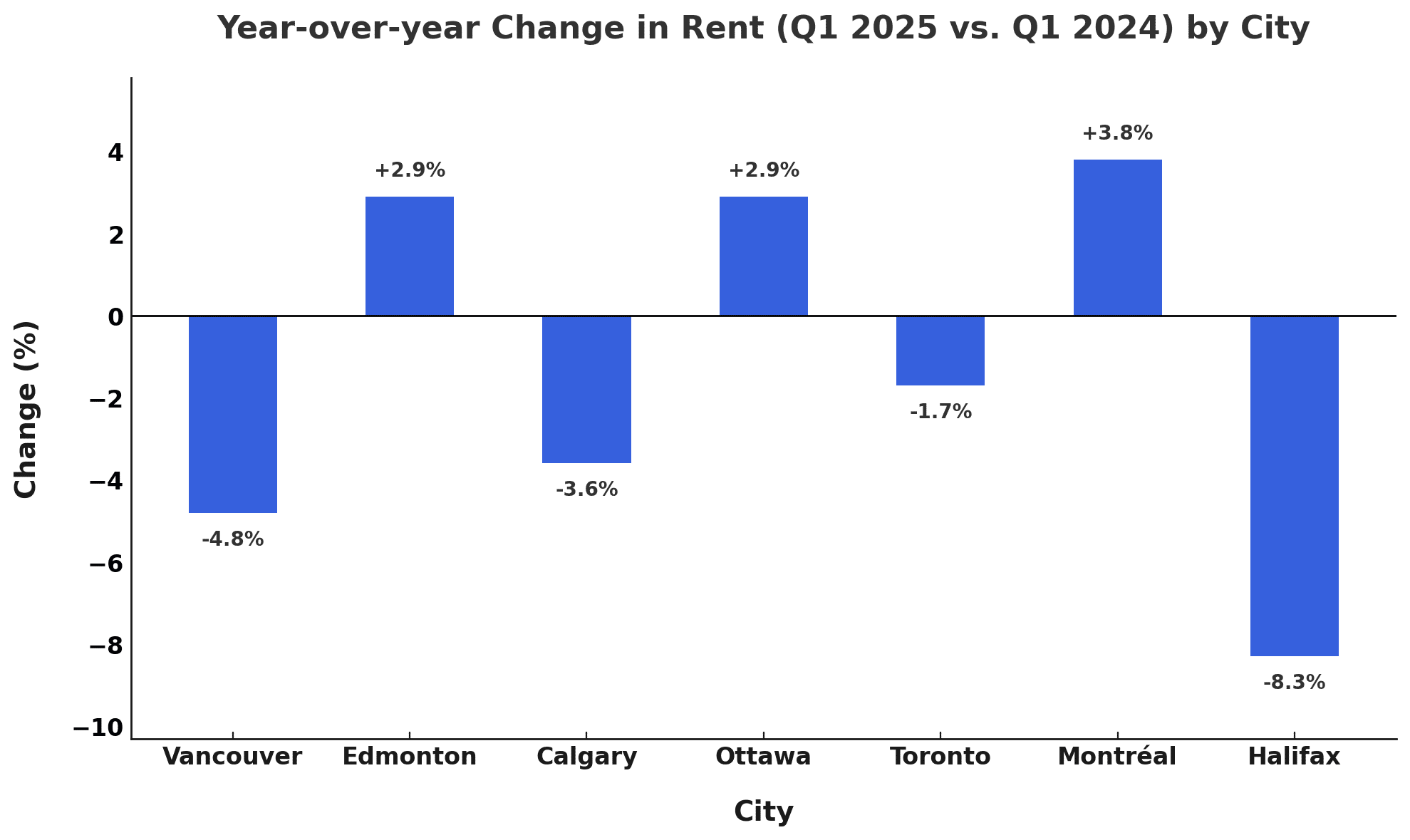Canada Rental Market 2025: Lower Rents and New Opportunities for Newcomers
If you’ve been feeling priced out of Canada’s rental market lately, there’s some good news to share—rents are finally starting to cool in several major cities. According to the Canada Mortgage and Housing Corporation (CMHC), the first quarter of 2025 saw a drop in advertised rents in cities like Toronto, Vancouver, Calgary, and Halifax. This shift could mean real opportunities for newcomers and renters across the country.
Let’s break down what’s driving these changes, which cities are seeing the biggest impacts, and how newcomers can take advantage of rent control and other cost-saving tips.
Key Highlights
- Advertised rents fell by up to 8% in cities like Halifax, Calgary, and Vancouver in early 2025.
- Rental supply is growing faster than demand, especially in major urban centres.
- Immigration changes and fewer international students are slowing population growth, reducing rental competition.
- Rent control regulations vary by province and can offer big savings for newcomers.
- Landlords are offering incentives like free rent and move-in bonuses due to higher vacancies.
What’s Happening with Rent Prices in Canada?
In the first quarter of 2025, big cities across Canada saw a noticeable drop in advertised rental rates. Cities like Vancouver, Calgary, Toronto, and Halifax experienced declines ranging between 2% and 8% compared to the same period in 2024.
Here’s a quick look at how rents have shifted year over year:

| City | Q1 2024 vs Q1 2023 | Q1 2025 vs Q1 2024 |
|---|---|---|
| Vancouver | +1.2% | -4.8% |
| Calgary | +10.7% | -3.6% |
| Toronto | -0.5% | -1.7% |
| Halifax | +11.7% | -8.3% |
| Edmonton | +10.0% | +2.9% |
| Ottawa | +3.8% | +2.9% |
| Montréal | +2.4% | +3.8% |
Why the drop? According to CMHC, the softening rental market is largely due to less demand—thanks in part to fewer temporary residents and international students—and more supply of rental units than we’ve seen in the past decade.
Landlords Are Competing for Tenants
With more rental units available and fewer people to fill them, landlords are finding it harder to lease their properties—especially new, purpose-built rental buildings in hot markets like Toronto and Vancouver. Some landlords are even offering perks like:
- One month of free rent
- Moving allowances
- Signing bonuses
Secondary rental markets (like private condos and basement apartments) are also adjusting. Owners in these segments are often quicker to drop prices to reduce vacancies, adding more downward pressure on rents overall.
How Immigration Changes Are Affecting Rent
Canada’s population growth has slowed considerably in 2025, and that’s playing a big role in the rental market’s shift. CMHC and Statistics Canada report a notable dip in the number of temporary residents, including work and study permit holders.
Between January and April 2025, the number of temporary residents in Canada fell by over 61,000. At the same time, the government’s international student cap and a reduction in new permanent residents have further reduced housing demand, especially in places like Ontario, British Columbia, and Nova Scotia.
With fewer newcomers entering the rental market, prices are adjusting accordingly—especially in cities near post-secondary institutions or major employment hubs.
Affordability Still an Issue
While rents are falling, affordability is still a major concern. CMHC tracks advertised rent-to-income ratios across major cities, and in many places, renters are still spending a significant portion of their income on housing.
| City | 2022 | 2023 | 2024 | 2025 |
|---|---|---|---|---|
| Vancouver | 18.2% | 17.0% | 16.3% | 17.8% |
| Toronto | 14.5% | 14.7% | 15.2% | 16.4% |
| Calgary | 11.6% | 12.4% | 14.1% | 13.7% |
| Montréal | 11.5% | 12.2% | 13.2% | 13.3% |
| Edmonton | 11.5% | 12.2% | 12.3% | 12.5% |
So, while we’re seeing a dip in rents, many families and newcomers are still paying a sizable chunk of their income just to keep a roof over their heads.
Rent Control Can Make a Big Difference for Newcomers
If you’re new to Canada or planning your move, one way to save on housing costs is to understand how rent control works in your province. Rent control laws limit how much landlords can raise the rent each year, making it easier to plan your budget and avoid sudden spikes in housing costs.
| Province | Rent Control? |
|---|---|
| British Columbia | Yes |
| Ontario | Yes** |
| Manitoba | Yes |
| Nova Scotia | Yes* |
| Alberta | No |
| Quebec | No |
| Saskatchewan | No |
*In Nova Scotia, rent increases are capped at 5% annually until December 31, 2027.
**In Ontario, rent control only applies to buildings first occupied before November 15, 2018.
If you’re considering settling in Manitoba, for example, the province has rent control in place—which can make a big difference in long-term affordability. Learn more about the Manitoba PNP if you’re thinking of moving there.
Final Thoughts
The 2025 rental landscape in Canada is shifting, and for newcomers and renters, that could mean lower rents, more selection, and better negotiating power. With population growth slowing and new rental units entering the market, we’re in a rare moment where tenants may have the upper hand—at least for now.
That said, affordability remains a challenge, and understanding your province’s rent control policies can be key to managing housing costs in the long run.
Looking for more tips on how to stretch your housing budget in Canada?
Download our FREE Newcomer’s Guide to Canada
It’s packed with practical advice on navigating the rental market, saving on living expenses, and getting settled in your new home.